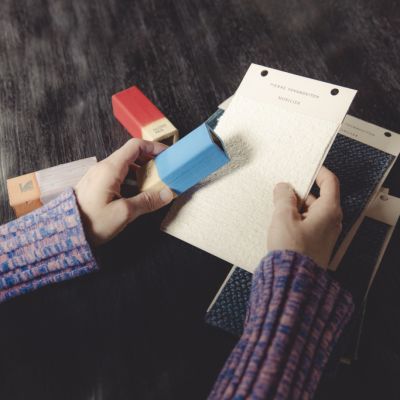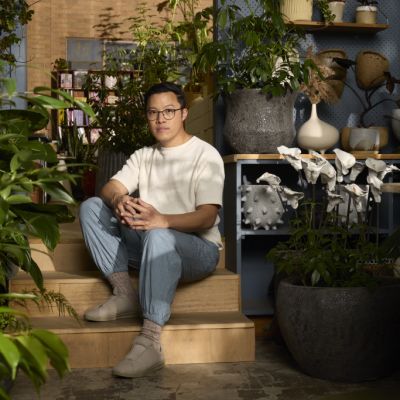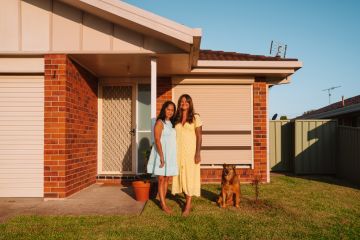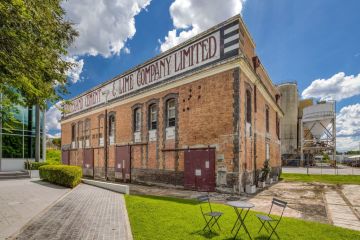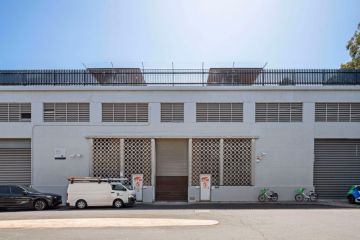Flush with success: At home with Who Gives a Crap CEO Simon Griffiths
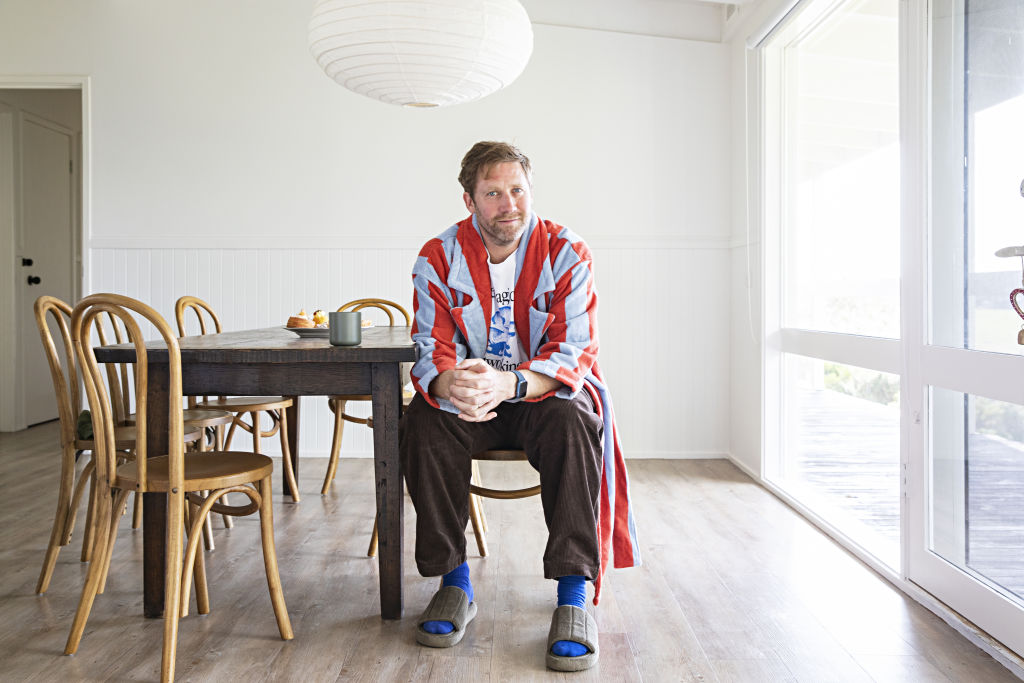
Today’s internet loves watching a filmed feat of endurance. But back in 2012, Simon Griffiths might have been the OG.
That’s when the Who Gives a Crap CEO famously launched the toilet paper brand by livestreaming himself sitting on a toilet in a Melbourne warehouse for 50 hours. Griffiths declared he would not get off the throne until the first $50,000 of his team’s Indiegogo crowdfunding campaign had been reached, so that the empty warehouse could be filled with its first bulk order.

TV and other media went wild for this pun-tastic opportunity, and the stunt became one of Indiegogo’s top five campaigns of the year. From that moment on, 50 per cent of the B-Corp-certified business’s profits have gone towards building toilets and improving sanitation in developing countries. It’s raised more than $13 million to date.
While the company was co-founded with Danny Alexander and Jehan Ratnatunga, it’s Griffiths who’s largely been the face – and the butt – of punny jokes. Gamely, he dons a fluffy robe for our shoot, but when the interview starts it’s serious business. Griffiths is chill, but his thoughts run to markets, growth and strategy. When I ask if his family will be settling here on the Mornington Peninsula after a stint living in LA, he considers, “What’s the true ROI for us as a family?”
This laser focus is understandable. Over the next few weeks, Griffiths has a conference in the South Pacific and is visiting South Africa and Mozambique on an impact trip. (And of course he wants to ensure he’s creating enough time to drop the kids off at the pool, so to speak.) Who Gives a Crap (WGAC) sells into 36 countries through subscriptions and now supermarkets, including Woolies and Aldi in Australia. The Melbourne-born brand recently triumphed in a “Loodunnit” investigation by UK consumer advocacy group Which?; the report confirmed its paper is 100 per cent bamboo, as opposed to other competitors making the same claim.
By the time Griffiths was eight years old, he was flyering his neighbourhood to set up a pet-minding business. When he turned 12, he launched a sand board range, because his native Perth didn’t have snow but plenty of sand dunes. He loved using his initiative – but there was a problem.
“When I sold something to someone I felt a little bit disgusted by the act of profiteering,” he says. “That part of the transaction felt icky and gross for me.”
Social enterprise was the perfect solution. At uni, while studying engineering and economics at the University of Melbourne, Griffiths fell in love with development economics and became fascinated by social mobility, fuelled further by his travels.

“As a good economist, I figured out it was cheaper for me to spend all of my university holidays in Southeast Asia than it was to go back to Western Australia,” he explains, “so I’d spend three or four months of every year in different parts of Asia, and then eventually further afield, through Central America and Africa. I realised that there was more to that passion than just hedonistic pursuit. It was actually this deep interest in why being born in one place gave you access to a set of opportunities that was entirely different to being born on the other side of an invisible borderline somewhere in the world.”
In 2007 he teamed up with university mates Matthew Tilleard and Jehan Ratnatunga, and web developer Mack Nevill, to form Ripple.org. The website generated money for charity by selling advertising impressions. “The goal there was to try and make philanthropy accessible to everyone, not just your Bill Gateses and Warren Buffetts,” he says. “We won a bunch of awards, but to be successful in that space you have to constantly innovate. It’s very expensive getting engineers and we were donating 100 per cent of our revenue, so there was nothing to reinvest.”
Then came Shebeen, a Melbourne venue with the feel of a South African speakeasy meets Mexican beach bar. The idea was to import beers and wines from all over the developing world, then pump the proceeds back into those regions.
“That business did really well initially and then we had a lot of challenges,” Griffiths says. “It didn’t quite achieve what we wanted to in terms of donations. The big realisation was that bricks and mortar is inherently unscalable.”
Okay, so what’s scalable? What’s one thing everybody needs, all over the world, and can be ordered online? Griffiths and Ratnatunga went to a supermarket to study the loo paper aisle. The major names had aligned their branding to puppies and feathers, avoiding any association with toilets. Who Gives a Crap would do the opposite.
“It gave us this defensible moat around our marketing message that we thought would allow us to cut through and potentially be successful in the long run,” Griffiths says.
There was some pushback from outraged members of public who consider “crap” to be a swear word – “at my son’s school, he’s the only person in his year that’s allowed to say the word ‘crap’ and he’s only allowed to say it in reference to where his dad works,” Griffiths says – but mostly the eye-catching wrappers won favour.

Customer loyalty was pursued through limited edition packaging such as the mix-and-match Play Edition, which won the D&AD Yellow Pencil design award; Flush Your Ex (in which rolls were made of recycled love notes from exes); a poetry edition; and a collaboration with Melbourne designer Beci Orpin, whose wrappers could be reused for craft projects. Following their recent collabs with Lewes FC and Heaps Normal, Griffiths promises more fun stuff on the horizon.
After launching in Australia, the company hit the UK and US in unison. The US, being 15 times the size of the Aussie market, was vital if they wanted to put a dent in the global sanitation problem.
But it was the Great Loo Roll Crisis of 2020 that absolutely catapulted WGAC into the big time. Griffiths was on parental leave when it struck, but noticed sales had gone up by 50 per cent over the weekend of February 29 and March 1. On the Monday of March 2 his phone rang at 7am. A radio station wanted an interview.
“That first day of March, we did two times a regular day of sales. The second of March, five times a regular day of sales. Third of March, 12 times a day of sales. The fourth of March, we’re going to do 30 to 40 times a regular day of sales,” he says. “There was this insane exponential growth and our supply chain team was like, ‘Turn it off! Turn off the website!’”

Somehow, they made it work. The WGAC website was the only place in Australia where TP was reliably available. A word-of-mouth phenomenon meant that an email sign-up list wound up with more than 600,000 new customers. The company tripled its customer service capacity by hiring a whole new team furloughed from elsewhere, and started running two teams in the warehouses.
“On June 30 we made a $5.85 million donation, which was this amazing cherry on top,” Griffiths says.
One legacy from that crazy period is now, at the beginning of every quarter, the company has a “slow week” – no meetings – so employees can figure out what their priorities are and avoid burnout.
“We subscribe to Dan Pink’s philosophy that he talks about in his book Drive, that to create motivation you focus on autonomy, mastery and purpose,” Griffiths says. It used to be the case that all new team members would go on an impact trip in their first two years to see how their hard work was paying off in other countries. “But that’s become harder as we’ve grown. You can’t walk into someone’s house with 250 people and say, ‘Can we have a look at your toilet?’”
I ask Griffiths what the hardest lesson has been to learn on his journey through various social enterprises and building WGAC to what it is today.
“I wasn’t someone who was naturally born with a ton of empathy,” he says frankly. “I think if you asked my wife or friends, they would probably say that that’s true of me. To be a great leader in a business, you have to have a lot of empathy to understand what’s going on in the team and what changes to make in order to have the most impact.”
But most CEOs are psychopaths, right?
“Yes, probably,” he allows with a smile. “But I think the most effective CEOs probably aren’t psychopaths. Also, to be customer-obsessed you have to have a lot of empathy for what your customer will be thinking about and going through. For me, probably one of the hardest things is that empathy isn’t innate, it’s a skill, and learning to harness that skill has been one of the bigger parts of my personal journey.”
This article first appeared in Domain Review, in partnership with Broadsheet.
We recommend
We thought you might like
States
Capital Cities
Capital Cities - Rentals
Popular Areas
Allhomes
More
